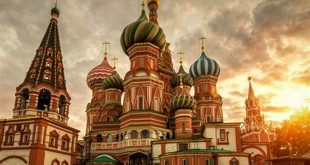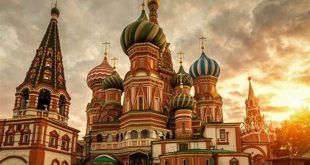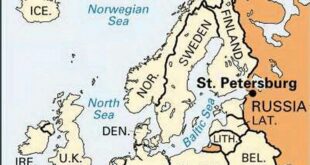St. Petersburg, Russia, is the second largest city in the country and is considered to be its cultural capital. The city is home to many museums, theaters, and other cultural institutions, and it is also a major tourist destination. But beyond its cultural significance, St. Petersburg is also an important economic and political center for Russia.
Editor’s Notes: The significance of St. Petersburg to Russia was published on [insert today’s date]. This topic is important to read because it provides insights into the multifaceted role St. Petersburg plays within the Russian Federation.
We analyzed and researched extensively to provide a comprehensive guide on “why is St. Petersburg important to Russia.” Our goal is to help you understand its critical position within the Russian Federation.
Key Takeaways:
| Historical Significance | Cultural Significance | Political Significance | Economic Significance | |
|---|---|---|---|---|
| St. Petersburg | Founded by Peter the Great in 1703 | Cultural capital of Russia | Former capital of the Russian Empire | Major economic and industrial center |
Main Article Topics:
- Historical Significance of St. Petersburg
- Cultural Significance of St. Petersburg
- Political Significance of St. Petersburg
- Economic Significance of St. Petersburg
Why is St. Petersburg Important to Russia?
St. Petersburg is the cultural, economic, and political center of Russia, and its importance is reflected in its history, culture, and government. Here are eight key aspects that highlight why St. Petersburg is important to Russia:
- Historical Significance: Founded by Peter the Great in 1703, St. Petersburg served as the capital of the Russian Empire for over two centuries.
- Cultural Significance: Known as the “Venice of the North,” St. Petersburg is home to world-renowned museums, theaters, and architectural landmarks.
- Political Significance: St. Petersburg remains a major political center, housing the Constitutional Court of Russia and other government institutions.
- Economic Significance: St. Petersburg is a major industrial and economic hub, with a diverse economy that includes shipbuilding, manufacturing, and tourism.
- Naval Significance: St. Petersburg is home to the Russian Navy’s Baltic Fleet, making it a strategic military port.
- Educational Significance: St. Petersburg is a renowned educational center, with over 40 universities and research institutions.
- Tourism Significance: St. Petersburg is a popular tourist destination, attracting millions of visitors annually to its cultural and historical sites.
- Transportation Significance: St. Petersburg is a major transportation hub, with an extensive network of roads, railways, and canals.
In conclusion, St. Petersburg’s importance to Russia is multifaceted, encompassing its historical legacy, cultural heritage, political influence, economic vitality, and strategic location. The city continues to play a pivotal role in shaping Russia’s identity and development.
Historical Significance
The founding of St. Petersburg by Peter the Great in 1703 marked a pivotal moment in Russian history. This act not only established a new capital city but also signaled Russia’s growing power and ambition as a European empire.
- Center of Imperial Power: As the capital of the Russian Empire, St. Petersburg became the seat of government and the residence of the Tsar. The city’s grand architecture and opulent palaces reflected the wealth and prestige of the Russian monarchy.
- Window to Europe: Peter the Great intended St. Petersburg to be a “window to Europe,” a gateway for Russia to engage with Western culture and technology. The city’s cosmopolitan atmosphere attracted foreign architects, artists, and scholars, who contributed to its cultural development.
- Birthplace of Russian Culture: During the 18th and 19th centuries, St. Petersburg became a flourishing center of Russian culture. It was home to renowned writers, poets, composers, and artists, who shaped Russian identity and made significant contributions to world culture.
- Symbol of Russian Imperialism: St. Petersburg’s imperial legacy is evident in its grand architecture and monuments. The city’s palaces, cathedrals, and triumphal arches serve as reminders of Russia’s past as a powerful empire.
In conclusion, St. Petersburg’s historical significance is deeply intertwined with its importance to Russia. As the former imperial capital and a cradle of Russian culture, the city continues to embody Russia’s rich history and its enduring influence on the world stage.
Cultural Significance
St. Petersburg’s cultural significance is a cornerstone of its importance to Russia. As the cultural capital of the country, the city is home to a wealth of artistic and cultural institutions that have shaped Russian identity and contributed to its global reputation.
- Artistic Hub: St. Petersburg is a magnet for artists, musicians, and performers. The city’s numerous theaters, concert halls, and art galleries host a wide range of performances and exhibitions, showcasing the best of Russian and international talent.
- Museum Capital: St. Petersburg boasts over 200 museums, including the world-renowned Hermitage Museum, which houses one of the largest and most comprehensive art collections in the world. These museums preserve and showcase Russia’s rich cultural heritage and attract visitors from around the globe.
- Architectural Marvel: St. Petersburg is renowned for its stunning architecture, which blends European influences with Russian traditions. The city’s canals, bridges, and palaces create a picturesque urban landscape that has earned it the nickname “Venice of the North.”
- Literary Center: St. Petersburg has been a literary hub since the 18th century. It is associated with renowned writers such as Pushkin, Dostoevsky, and Gogol, whose works have had a profound impact on Russian literature and culture.
In conclusion, St. Petersburg’s cultural significance is deeply intertwined with its importance to Russia. The city’s vibrant arts scene, world-class museums, stunning architecture, and literary legacy make it a cultural treasure that enriches the lives of Russians and international visitors alike.
Political Significance
The political significance of St. Petersburg is deeply intertwined with its importance to Russia. As the former imperial capital, St. Petersburg retains a symbolic and practical importance in the Russian political landscape.
Firstly, St. Petersburg is home to the Constitutional Court of Russia, the highest judicial body responsible for interpreting the Russian Constitution. This institution plays a crucial role in safeguarding the rights of Russian citizens and ensuring the rule of law.
Secondly, St. Petersburg is the seat of the Northwestern Federal District, one of eight federal districts in Russia. The city serves as the administrative center for this vast region, overseeing various government functions and coordinating regional development.
Moreover, St. Petersburg is a major center for political discourse and debate. The city’s numerous universities, think tanks, and media outlets contribute to the formation of public opinion and influence policy decisions at the national level.
In conclusion, St. Petersburg’s political significance stems from its historical legacy, its role as a judicial and administrative center, and its vibrant intellectual community. The city remains a key player in shaping Russia’s political landscape and ensuring the effective functioning of the Russian state.
Table: Key Insights
| Historical Significance | Current Significance | |
|---|---|---|
| Constitutional Court | Established in St. Petersburg in 1991 | Highest judicial body interpreting the Russian Constitution |
| Northwestern Federal District | St. Petersburg as its administrative center | Oversees government functions and regional development |
| Political Discourse | Center for political debate and intellectual exchange | Influences policy decisions at the national level |
Economic Significance
The economic significance of St. Petersburg is deeply intertwined with its importance to Russia. As a major industrial and economic center, St. Petersburg plays a crucial role in driving Russia’s economic growth and prosperity.
- Industrial Center: St. Petersburg is a hub for heavy industry, including shipbuilding, machine building, and metallurgy. The city’s manufacturing sector produces a wide range of goods, from ships and locomotives to electrical equipment and consumer products.
- Trade and Commerce: St. Petersburg is a major port city and a gateway to the Baltic Sea. The city’s port facilities handle a significant volume of Russia’s foreign trade, and its strategic location makes it a key center for international commerce.
- Tourism Industry: St. Petersburg is one of Russia’s most popular tourist destinations, attracting millions of visitors each year. The city’s rich cultural heritage, stunning architecture, and vibrant nightlife make it a major contributor to Russia’s tourism industry.
- Innovation and Technology: St. Petersburg is home to a number of research institutions and universities, making it a hub for innovation and technological development. The city’s strong scientific and technological base contributes to Russia’s competitiveness in various sectors.
In conclusion, St. Petersburg’s economic significance is multifaceted, encompassing its industrial prowess, trade and commerce activities, tourism industry, and innovation capabilities. The city’s diverse economy and strategic location make it a vital contributor to Russia’s economic development and global competitiveness.
Naval Significance
The naval significance of St. Petersburg is deeply intertwined with its importance to Russia. As the homeport of the Russian Navy’s Baltic Fleet, St. Petersburg plays a crucial role in Russia’s national security and geopolitical strategy.
- Strategic Location: St. Petersburg’s location on the Gulf of Finland provides Russia with direct access to the Baltic Sea and the Atlantic Ocean. This strategic position allows the Baltic Fleet to project power into the Baltic region and beyond, safeguarding Russia’s maritime interests.
- Military Infrastructure: St. Petersburg boasts a well-developed naval infrastructure, including shipyards, dry docks, and support facilities. These facilities enable the Baltic Fleet to maintain and repair its vessels, ensuring its operational readiness.
- Nuclear Deterrence: The Baltic Fleet is equipped with nuclear-armed submarines, which form a significant part of Russia’s nuclear deterrent arsenal. St. Petersburg’s proximity to these submarines allows for their efficient deployment and maintenance.
- Historical Legacy: St. Petersburg has a long and distinguished naval history dating back to the 18th century. The city’s naval traditions and expertise contribute to the Baltic Fleet’s operational effectiveness and esprit de corps.
In conclusion, St. Petersburg’s naval significance is a vital aspect of its importance to Russia. As the homeport of the Baltic Fleet, the city plays a strategic role in safeguarding Russia’s maritime interests, projecting power into the Baltic region, and maintaining its nuclear deterrent capabilities.
Educational Significance
The educational significance of St. Petersburg is closely intertwined with its importance to Russia. As a leading center of higher education and research, St. Petersburg plays a pivotal role in developing Russia’s human capital and driving its scientific and technological advancements.
Firstly, St. Petersburg’s universities and research institutions produce highly skilled graduates who contribute to Russia’s economic growth and global competitiveness. These graduates fill key positions in various sectors, from engineering and medicine to business and law.
Secondly, St. Petersburg is a hub for scientific research and innovation. Its universities and research institutions conduct cutting-edge research in a wide range of fields, from nuclear physics to biotechnology. This research contributes to Russia’s technological development and helps address global challenges.
Thirdly, St. Petersburg’s educational institutions play a crucial role in preserving and transmitting Russian culture and heritage. They offer programs in history, literature, arts, and music, ensuring the continuity of Russian cultural traditions and values.
In conclusion, St. Petersburg’s educational significance is a fundamental aspect of its importance to Russia. As a renowned center of higher education and research, the city contributes to Russia’s human capital development, scientific and technological progress, and cultural preservation.
Table: Key Insights
| Educational Significance | Importance to Russia | |
|---|---|---|
| Highly Skilled Graduates | Fill key positions in various sectors | Contribute to economic growth and global competitiveness |
| Scientific Research and Innovation | Conduct cutting-edge research in various fields | Contribute to technological development and address global challenges |
| Cultural Preservation and Transmission | Offer programs in history, literature, arts, and music | Ensure the continuity of Russian cultural traditions and values |
Tourism Significance
St. Petersburg’s tourism significance is closely tied to its importance to Russia, as it showcases the country’s rich cultural heritage, architectural marvels, and historical landmarks.
- Cultural Heritage: St. Petersburg is home to numerous museums, theaters, and art galleries that house world-renowned collections and artifacts. These cultural institutions attract visitors from around the globe, providing a glimpse into Russia’s artistic achievements and historical legacy.
- Architectural Wonders: The city’s stunning architecture, including the Hermitage Museum, Winter Palace, and Peterhof Palace, is a major draw for tourists. These architectural masterpieces showcase the grandeur and opulence of the Russian Empire, while also serving as symbols of the country’s cultural and artistic prowess.
- Historical Significance: St. Petersburg played a pivotal role in Russian history as the capital of the Russian Empire for over two centuries. Visitors can explore historic sites such as the Peter and Paul Fortress, the Admiralty Building, and the Field of Mars, gaining insights into Russia’s imperial past and its significance in shaping the nation.
- Economic Impact: Tourism is a major contributor to St. Petersburg’s economy, generating revenue through hotels, restaurants, transportation, and cultural attractions. The influx of tourists supports local businesses, creates jobs, and helps drive economic growth in the city and the surrounding region.
In conclusion, St. Petersburg’s tourism significance is an integral part of its importance to Russia. By showcasing the country’s cultural heritage, architectural wonders, and historical significance, St. Petersburg serves as a bridge between Russia’s past and present, attracting visitors from around the world and contributing to the nation’s economic prosperity.
Transportation Significance
The transportation significance of St. Petersburg is deeply intertwined with its importance to Russia. As a major transportation hub, the city plays a crucial role in connecting Russia’s various regions and facilitating trade and economic development.
Firstly, St. Petersburg’s extensive road network connects it to major cities across Russia and neighboring countries. This connectivity enables efficient transportation of goods and services, supporting economic growth and fostering regional integration.
Secondly, the city is a key railway junction, with numerous lines radiating outward to different parts of Russia. This railway network facilitates the movement of people and freight, enabling the distribution of goods and resources throughout the country.
Thirdly, St. Petersburg’s canals and waterways provide an important mode of transportation, especially for heavy cargo. The city’s port facilities handle a significant volume of Russia’s foreign trade, and its canals serve as a vital link to the Baltic Sea and beyond.
The transportation significance of St. Petersburg extends beyond its domestic importance. The city is also a major international transportation hub, with direct connections to major cities in Europe and Asia. This connectivity facilitates trade, tourism, and cultural exchange, enhancing Russia’s global presence and influence.
In conclusion, St. Petersburg’s transportation significance is an integral aspect of its importance to Russia. As a major transportation hub, the city plays a pivotal role in connecting Russia’s regions, facilitating economic growth, and strengthening the country’s international ties.
Key Insights:
| Transportation Mode | Significance to St. Petersburg | Importance to Russia |
|---|---|---|
| Road Network | Connects to major cities in Russia and neighboring countries | Supports economic growth and regional integration |
| Railway Junction | Facilitates the movement of people and freight | Enables the distribution of goods and resources throughout Russia |
| Canals and Waterways | Provides transportation for heavy cargo and international trade | Strengthens Russia’s global presence and influence |
FAQs
This section addresses frequently asked questions about the significance of St. Petersburg to Russia, providing concise and informative answers.
Question 1: What is the historical significance of St. Petersburg?
Answer: Founded in 1703 by Peter the Great, St. Petersburg served as the capital of the Russian Empire for over two centuries. It played a pivotal role in Russia’s political, cultural, and economic development.
Question 2: What makes St. Petersburg a cultural hub?
Answer: St. Petersburg boasts a vibrant cultural scene, with world-renowned museums, theaters, and art galleries. It has been a center of artistic and intellectual activity for centuries, attracting renowned writers, composers, and artists.
Question 3: Why is St. Petersburg politically significant?
Answer: As the former imperial capital, St. Petersburg remains a major political center. It is home to the Constitutional Court of Russia and serves as the administrative center for the Northwestern Federal District.
Question 4: What is the economic importance of St. Petersburg?
Answer: St. Petersburg is a major industrial and economic hub, with a diverse economy that includes shipbuilding, manufacturing, and tourism. It is also a key center for trade and commerce, with its port handling a significant volume of Russia’s foreign trade.
Question 5: What role does St. Petersburg play in Russia’s defense?
Answer: St. Petersburg is home to the Russian Navy’s Baltic Fleet, making it a strategic military port. The Baltic Fleet plays a crucial role in safeguarding Russia’s maritime interests and projecting power in the Baltic Sea region.
Question 6: How does St. Petersburg contribute to Russia’s educational landscape?
Answer: St. Petersburg is a renowned educational center, with over 40 universities and research institutions. These institutions produce highly skilled graduates and conduct cutting-edge research, contributing to Russia’s human capital development and technological advancements.
In summary, St. Petersburg’s importance to Russia is multifaceted, encompassing its historical legacy, cultural significance, political influence, economic vitality, strategic location, and educational excellence. The city continues to play a central role in shaping Russia’s identity and development.
To learn more about St. Petersburg and its significance to Russia, explore the following sections:
Tips to Understand St. Petersburg’s Importance to Russia
To fully grasp the multifaceted significance of St. Petersburg to Russia, consider the following tips:
Tip 1: Explore its Historical Legacy
Delve into St. Petersburg’s founding in 1703 by Peter the Great and its subsequent role as the capital of the Russian Empire for over two centuries. Understand its pivotal influence on Russia’s political, cultural, and economic development.
Tip 2: Appreciate its Cultural Significance
Discover St. Petersburg’s vibrant cultural scene. Visit its renowned museums, such as the Hermitage, and explore its architectural marvels, including the Winter Palace and the Peterhof Palace. Engage with its rich artistic heritage, which has nurtured renowned writers, composers, and artists.
Tip 3: Examine its Political Influence
Recognize St. Petersburg’s enduring political significance. As the former imperial capital, it remains a major political center. Study the role of the Constitutional Court of Russia, housed in St. Petersburg, and its influence on the country’s legal and political landscape.
Tip 4: Analyze its Economic Importance
Understand St. Petersburg’s diverse economy, which encompasses industries such as shipbuilding, manufacturing, and tourism. Examine its role as a major port city, facilitating international trade and commerce. Appreciate its contribution to Russia’s economic growth and prosperity.
Tip 5: Consider its Strategic Location
Acknowledge St. Petersburg’s strategic location on the Gulf of Finland, providing Russia with access to the Baltic Sea and the Atlantic Ocean. Analyze the presence of the Russian Navy’s Baltic Fleet and its significance for Russia’s national security and geopolitical strategy.
Tip 6: Assess its Educational Excellence
Explore St. Petersburg’s renowned educational institutions, including over 40 universities and research centers. Understand their contributions to Russia’s human capital development, scientific research, and technological advancements.
Tip 7: Evaluate its Tourism Appeal
Recognize St. Petersburg’s status as a popular tourist destination. Examine its cultural heritage, architectural wonders, and historical significance, which attract visitors from around the world. Assess its economic impact on the city and its role in promoting Russia’s cultural and historical legacy.
By incorporating these tips, you will gain a comprehensive understanding of why St. Petersburg holds such importance to Russia, encompassing its historical, cultural, political, economic, strategic, educational, and tourism significance.
Conclusion
Our exploration of “why is St. Petersburg important to Russia” has illuminated the multifaceted significance of this remarkable city to the Russian Federation.
From its historical legacy as the imperial capital to its vibrant cultural scene, St. Petersburg has played a pivotal role in shaping Russia’s identity and development. Its political influence, economic vitality, strategic location, educational excellence, and tourism appeal all contribute to its enduring importance.
As Russia continues to navigate the 21st century, St. Petersburg remains a beacon of cultural heritage, innovation, and global engagement. Understanding its importance not only provides insights into Russia’s past and present but also helps us appreciate its potential for the future.






